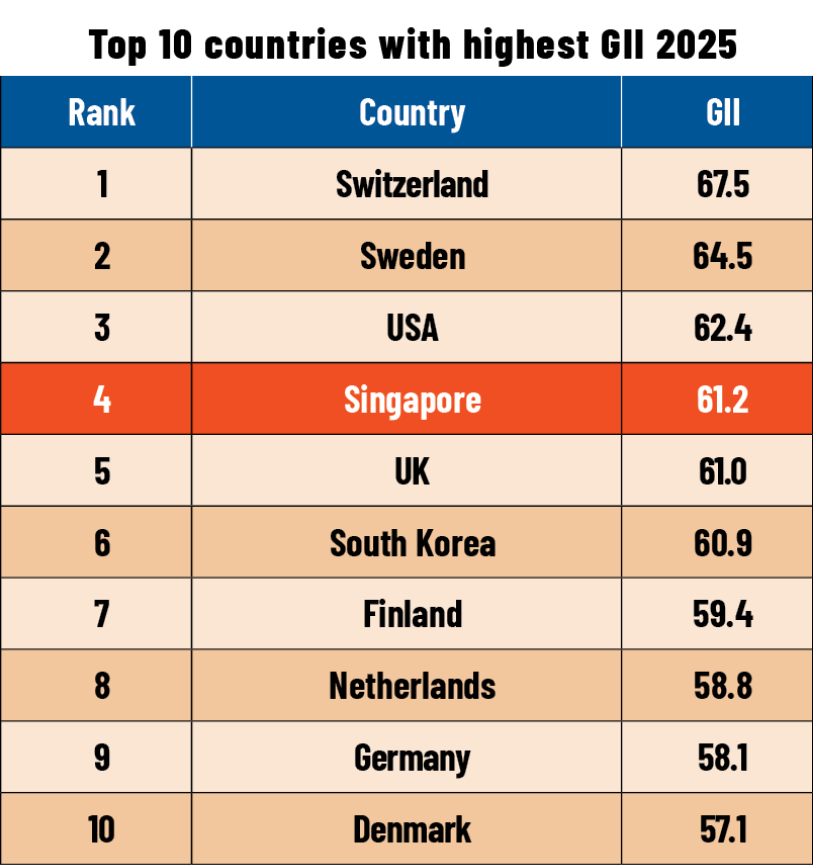
Asia has been making a name for itself as a global hub for startup innovation, driven by an emerging tech-savvy middle class, strong government support, and a growing venture capital (VC) base. Recent VC fundings in Asia, and globally, mostly concentrated on startups centring around artificial intelligence and large language models.
In the first nine months of 2024, Southeast Asia startups raised US$3.26 billion across 474 deals, down 48% compared to US$6.3 billion a year ago. The dip, starkly apparent in China and Southeast Asia, was due to a sharper focus on profitability, a shift in market conditions, as well as government policies. Nonetheless, the region remains a hotbed for innovation and entrepreneurship.
In terms of having a vibrant startup ecosystem, Singapore remains a standout player in the region, clinching top spot in the grouping comprising Southeast Asia, East Asia and Oceania (SEAO) in the Global Innovation Index (GII) 2025. Globally, it ranks fourth, after Switzerland (first spot), Sweden (second), and the United States of America (third). The United Kingdom rounds off the top five countries. Korea (sixth) is the only other SEAO country that made it into the top 10 list. As in previous GII rankings, Singapore scores highly across factors such as government effectiveness, access to information and communications technology, unicorn valuations, and VC – all of which are crucial to support disruptive innovations.

The GII 2025 report highlights the special traits of the top-ranked countries that are crucial for innovation:
The annual GII, published by the World Intellectual Property Organization, is a comprehensive tool that ranks countries based on their innovation capabilities and performance. It evaluates economies across various metrics, including knowledge creation, technology outputs, infrastructure, and market sophistication. The index provides insights into how nations foster and sustain innovation, which is critical for economic growth and global competitiveness.
In January 2025, the Consumer Technology Association (CTA) announced its 2025 Global Innovation Scorecard (GIS), which measures the political, economic and demographic factors that foster innovation. Given that innovation underlies entrepreneurship, it comes as no surprise that the GIS-listed Innovation Champions also feature favourably in rankings like GII and The Global Startup Ecosystem Report 2024 (see CA Lab, July 2024).
The highest ranking of Innovation Champion honours nations with a diverse and highly skilled workforce, fast broadband, a friendly climate for entrepreneurs, and openness to new technologies like Web 3.0 technologies, autonomous vehicles, and blockchain.
“Technology drives solutions to global challenges, from access to healthcare and mobility to energy and sustainability,” said Gary Shapiro, CEO and Vice Chair, CTA. “Our Innovation Champions exemplify the transformative power of collaboration between government and industry to enhance lives worldwide. We aspire for global leaders to learn from each other and fully harness the benefits of technology in the future.”
Regionally, the Innovation Champions are, respectively by highest score, Singapore, New Zealand, Australia, Japan, and South Korea. The areas in which they scored exceptionally well (A+) are:
Other countries in the 2025 list (in alphabetical order) are Austria, Canada, Czech Republic, Denmark, Estonia, Finland, France, Germany, Iceland, Ireland, Israel, Luxembourg, Netherlands, Norway, Portugal, Spain, Sweden, Switzerland, UK, and USA.
Startups have notoriously high rates of failure – 20% will not survive the first two years, and 65% will not make it past the first decade. As the competition heats up for VC funding, investors will be more discerning as they look for businesses with clear plans for sustainable growth and profitability. Evidently, entrepreneurs have their work cut out for them – innovate, but remember that longevity and money matter as well.